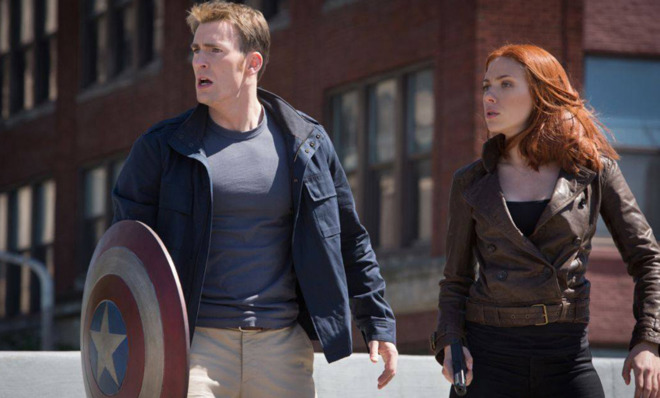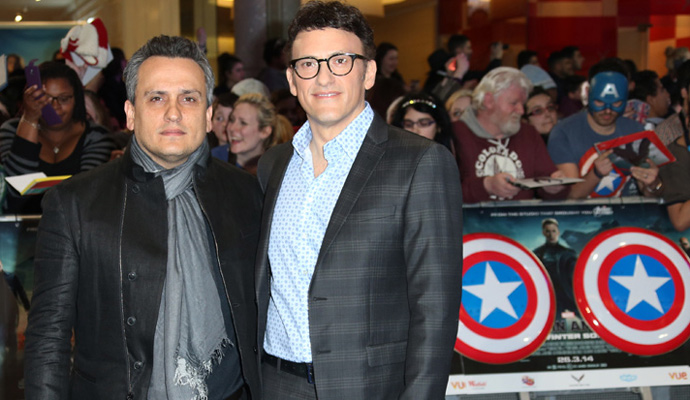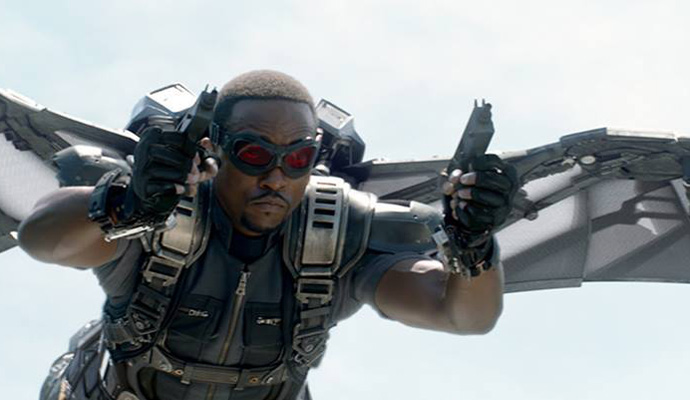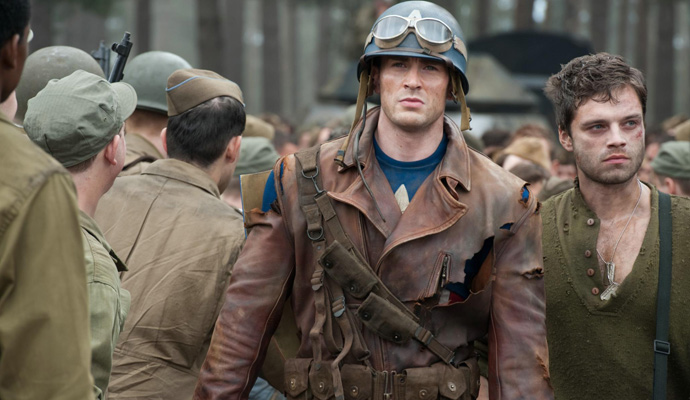An interview with the directors of Captain America: The Winter Soldier
The brothers behind the new Marvel movie talk about Obama's kill list, how Arrested Development informed their creative process, and working with Robert Redford

A free daily email with the biggest news stories of the day – and the best features from TheWeek.com
You are now subscribed
Your newsletter sign-up was successful
Now that we're in the midst of the second stage of the Marvel Avengers series, the stakes and expectations are higher than they've ever been.
In 2012, The Avengers became one of the highest-grossing films of all time — and the franchise's success story has continued unabated since. That puts a lot of responsibility (with great power comes great responsibility, as Uncle Ben once said) on filmmakers like Anthony and Joe Russo, who are best known for their work on television comedies Arrested Development, Happy Endings, and Community. The brothers' latest project was directing Captain America: The Winter Soldier, the newest entry in the Avengers series which arrives in theaters today. I recently sat down with the duo to talk about their love of comic books, how contemporary issues made their way onscreen, and why they were so thrilled to work with Oscar winner Robert Redford.
Here's a (slightly edited) transcript of our conversation:
The Week
Escape your echo chamber. Get the facts behind the news, plus analysis from multiple perspectives.

Sign up for The Week's Free Newsletters
From our morning news briefing to a weekly Good News Newsletter, get the best of The Week delivered directly to your inbox.
From our morning news briefing to a weekly Good News Newsletter, get the best of The Week delivered directly to your inbox.

So first tell me about your relationship with Captain America. Are you long-time fans of the comics?
Joe: Yeah. I started collecting comics when I was 10… One of the first books I ever got oddly was a Cap-Falcon team-up. So it's surreal to be talking about this 30 years later — having made a film of Captain America and Falcon.
I had a very specific interpretation of him [Captain America] when I was a kid. I always thought he was a little too much of a boy scout for me. I like darker material. I like Frank Miller's Dark Knight. There were a lot of independent comics coming out when I was collecting and they were deconstructing superheroes. We liked deconstructing them. We liked deconstructing the mythology. Figure out what makes them tick and then putting them in a very modern environment so that they feel relatable. As a kid, I always imagined Steve McQueen as Cap in my head cause that gave it a little more bite. So when we got the opportunity to make a film, that was what we wanted to bring to the character.
So how did you originally get the film?
A free daily email with the biggest news stories of the day – and the best features from TheWeek.com
Joe: We were working on Community at NBC. Community is a genre-spoofing comedy show and we had done these paintball episodes, which are action spoofs, and [Marvel President] Kevin [Feige] was a big fan of Community… and asked us to come in and talk about Captain America. We came in, sat down, and he told us that they wanted a 70s thriller-inspired movie. Well, we grew up on 70s thrillers. We're film geeks. We used to watch The Late Show with our Dad when we were kids. French Connection. Parallax View…So the fact that it was Captain America and a 70s thriller — it really sunk into our sweet spot.
[To Anthony] I heard you read The New York Times' article about Obama's kill list and the concept of that list made it into this movie. Can you tell me a little bit about that?
Anthony: Here's the thing. The movie is inspired by 70s political thrillers and those movies were so fantastic and powerful because the time period was so dark and tense on a political level. [The films] fed these collective anxieties we all had and then those stories found a way to make that experience very personal to the lead character and the audience.
We find ourselves in a similar climate today in a post 9/11 world — in a difficult, complicated time and so when we were developing the script… this article came out in The New York Times right around that same time and it was "wow, a Democratic president of the United States has a kill list. He sits down with his advisers every Tuesday morning and goes through it and decides who's gonna die." Then we enact drone strikes on those people and sometimes innocent people get killed during those drone strikes. I remember one strike in particular I read about: Somebody's family got killed with him and he had daughters. I just started thinking about how does President Obama talk to his own daughters about the fact that he killed these innocent girls in the process of getting this legitimately bad person? It seemed like such a morally complicated situation that was really the paradox at the center of this political film and political climate. The tension between freedom and security.
So as soon as you started the project, that [idea] was always in the back of your head and this article brought it to the foreground?
Anthony: It just helped us get more specific with the theme.
Joe: We wanted strong thematics in the movie because if you're gonna make a political thriller, it's got to be relevant to the audience. They have to feel the anxieties of the lead character. They have to go "That's the world I live in. Those are the same anxieties I have." Then it's a very immediate viewing for them. They're present in the viewing of the movie. For us, it was "so you have a kill list. Then what if he expanded it and what if he expanded it from there. Is there a prerequisite of a certain amount of individuals that if you just got rid of, would the world become much safer?"
Anthony: And what if you had the next generation of what drone technology is, which is way more effective and can get to way more people faster?

How do you balance creating a political thriller with a comic book movie? You're dealing with two different kinds of fans.
Anthony: It's a really good question. Part of our creative process has always been combining incongruous elements… It's challenging tonally to figure out how to do that and we think it leads you to fresh areas — when you smash a few things that aren't necessarily partners into each other.
You can see that in our work like in Arrested Development. It's complete absurdism married to a documentary-style reality television approach to shooting it. The combination of those two things is kind of weird and wonderful, I think. Similarly in this movie, we loved the idea. Marvel's been so successful at what they do. They've given us so many wonderful movies to this point. You have to figure out, how do you keep surprising the audience? How do you push the movies into fresh areas? Like Joe was saying, we love comic books and we've always loved this specific film genre. Those movies from the 70s helped us form our understanding of cinema, so the fact that we could take these two passions and smash them together and figure out how to marry them was a really exciting challenge for us.
So at the end of the day, the movie has to kind of fully be both. You have to figure out how you marry [the concepts] on a narrative level, on a stylistic level, and on a tonal level so that the movie is fully both a political thriller and a comic book movie.
Do you think you could've done it if you weren't fans of the comic book?
Anthony: We couldn't have done it as well.
Joe: The thing we've learned over the years is that passion is incredibly important to success. The reason is because you can only make the movie based on your own taste and what it is you want to see and how you feel about the material. The minute you try to guess what the audience wants or what the material requires, you're gonna screw it up… When we're really passionate about the material, we do our best work.
Anothony: One of the great joys of this movie is that we are the target audience for this movie so it was very easy for us to make this movie for ourselves because we were in line with the audience.
What did you learn after seeing the first Captain America? Were there any things you wanted to repeat or things you wanted to avoid?
Anothony: We look at that first Captain America as sort of a wonderful love letter to the golden-age origins of the character. That's not necessarily our favorite iteration of the character…
We were much more attracted to what Ed Brubaker was doing with the character in 2005 — a more complicated darker, tonally-textured version of the character. That's how we moved away from the first movie and we had a wonderful excuse for it because Cap was frozen for 70 years. So part of the fun in the narrative is you want to take that character as far away from where he started as possible … in a world that's radically different from the one he came from.

So many of the recent Marvel films have been massively successful. What do you think are the core ingredients of that success?
Anthony: Kevin has said before he has more of an emphasis on entertainment in the equation than perhaps some of the other companies doing comic book movies. I think that's one key ingredient of why the movies are so popular. There's a sense of fun in these films that maybe you don't always find in some other versions of comic book movies.
Joe: But the best ones all have an emotional core to them…That's another thing about Marvel. The heroes are really the focus, not necessarily the villains, which also makes the movies compelling because you can really get behind the heroes, but the heroes are flawed. If you play the reality of the flaw — if you give it stakes — I think that's what makes the movies work the best. I just remember sitting in a theater watching the first ten minutes of [the first] Iron Man. I thought it was fantastic. It was shocking. They made these other characters in the Humvee with [Robert Downey Jr.] likeable, gave them camera time, and then they killed them as a way to teach the character a lesson about his own weapons. That was a very cool choice for ten minutes into a comic book movie.
Have you guys thought about doing another Marvel movie?
Anthony: We're talking to them about doing Cap 3. We're just in the formative stages of it. When you see this film, you'll see it's a little bit of a two-parter… There's more to be explored there.
Tell me about bringing Robert Redford into the project.
Anthony: He's a legend. The second his name came up, we couldn't get him out of our minds for the role. He was too perfect for Captain. The fact that we got him was a miracle. He's so professional… A very disciplined actor and man. When we met him, he just diffuses any kind of tension in seconds. He made us lunch the first time we met him. I loved the way he opened with us. He's like "Guys I gotta be honest with you. I don't know what these movies are but my grandkids love 'em." It was a nice way to begin it.
He's been important not just because of Three Days of the Condor. The fact that he was very specific to the inspirations for this movie. But also, he started Sundance. That indie film movement in the 90s — the do-it-yourself credit card movie. That's how we found our way into the film business. We didn't go through Sundance but we went through Slamdance, which runs concurrently. He in a way created the whole road where two guys from Cleveland found their way into the movie business, so he's just a gigantic figure for us.
John Hanlon is a contributing editor at Townhall Magazine and a freelance film critic. He has written for CNN.com, USAToday.com, Big Hollywood, the Daily Caller, and Townhall.com as well as numerous other outlets. His movie reviews appear on Big Hollywood, RottenTomatoes.com, and JohnHanlonReviews.com. Hanlon has also appeared on "The Dennis Miller Show," "The Hugh Hewitt Show," and the Reelz television program "Mark at the Movies." A native of Massachusetts, Hanlon now lives in the D.C. suburbs.
-
 The ‘ravenous’ demand for Cornish minerals
The ‘ravenous’ demand for Cornish mineralsUnder the Radar Growing need for critical minerals to power tech has intensified ‘appetite’ for lithium, which could be a ‘huge boon’ for local economy
-
 Why are election experts taking Trump’s midterm threats seriously?
Why are election experts taking Trump’s midterm threats seriously?IN THE SPOTLIGHT As the president muses about polling place deployments and a centralized electoral system aimed at one-party control, lawmakers are taking this administration at its word
-
 ‘Restaurateurs have become millionaires’
‘Restaurateurs have become millionaires’Instant Opinion Opinion, comment and editorials of the day